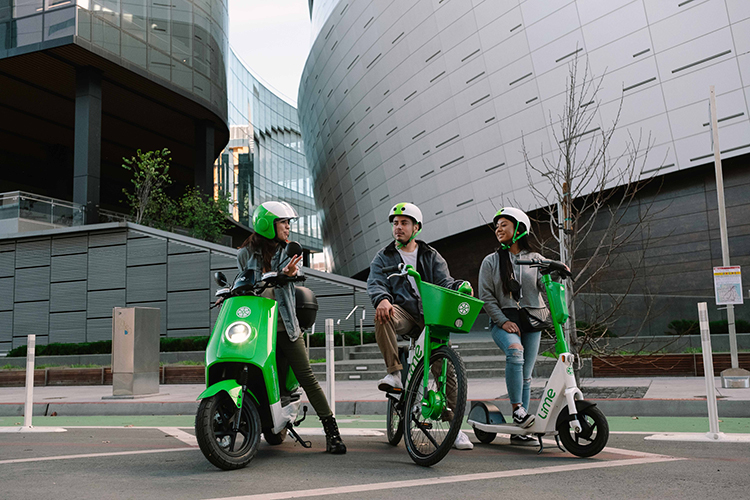How can we ensure micromoblility remains safe?
- Like
- Digg
- Del
- Tumblr
- VKontakte
- Buffer
- Love This
- Odnoklassniki
- Meneame
- Blogger
- Amazon
- Yahoo Mail
- Gmail
- AOL
- Newsvine
- HackerNews
- Evernote
- MySpace
- Mail.ru
- Viadeo
- Line
- Comments
- Yummly
- SMS
- Viber
- Telegram
- Subscribe
- Skype
- Facebook Messenger
- Kakao
- LiveJournal
- Yammer
- Edgar
- Fintel
- Mix
- Instapaper
- Copy Link
Posted: 10 February 2021 | Joshua Minchin - Intelligent Transport | No comments yet
As Lime looks to launch e-mopeds in Paris and Washington DC, we ask how operators can ensure micromobility modes can remain safe for riders and other road users?


Lime's e-mopeds will launch in Washington DC and Paris initially
We spoke to Ilona Lartigue of micromobility operator Lime to discuss the company’s new venture into e-mopeds in Paris and Washington DC. In addition, Lartigue talks through Lime’s safety and security policies as it moves to reassure authorities and residents alike that its micromobility solutions are a safe and convenient way to travel.
Why did you decide to take the step to providing e-mopeds?
Ilona Lartigue: Our ambition, plan and vision has always been bigger than e-scooters. We really wanted to become a true multi-modal mobility platform for all types of rides, to meet all types of needs users might have.
E-mopeds are just a consequent step for us on the way to the materialisation of this vision after scooters and bikes. In many cities in Europe, we are already an active multimodal platform, and with one more mode, we hope to make the platform even more accessible for people, and as a result help to reduce car ownership and car usage across cities.
What steps have you taken to make sure that these e-mopeds are safe, both for riders and for other road users?
IL: We actually leaned very heavily into safety when working on the e-mopeds, because we had time to both on the one hand observe what competitors have been doing in that space, and also talk to the cities where we already operate with our e-bikes and e-scooters and listen to their concerns. Safety was definitely one of the biggest concerns.
We are actually implementing some of the, I would say, most progressive safety features when it comes to mopeds in the world. We’ll have helmet detection technology (riders will have to take a selfie of them wearing a helmet before the ride) that is going to help make sure that a person who is riding any moped will actually wear a helmet. We’re also introducing a first-of-its-kind infrared sensor in each helmet case to detect if helmets are in the case once a rider starts their ride.
In addition, we are going to check for a valid driver’s license through scanning and face recognition technology, to make sure that the person who is going to use moped is the one who has a permit to do so.
We are also providing a range of parking features. We’ll have preferred parking zones, as well as no parking and no locking zone features for better use of shared public space. In Paris and Washington DC, for instance, we have local parking restrictions along with generic parking rules that apply to every trip.
We will also incorporate the features that are already working well for our e-scooter and e-biking business. For instance, technology that helps to detect a crash in real time and to contact the rider to see whether they need help from emergency services. We have technology that signals that a person might have been consuming alcohol, and we then propose them to take a ride sharing trip with Uber, our partner.


Washington DC will welcome Lime’s e-mopeds alongside Paris
How do you ensure your moped are secure and not being used for potential illegal activity?
IL: I think the key to all of this is really working closely with the city. That’s why we are starting the service in just one city in Europe on a very small scale, because we want to see how this is going to work, and what will be the initial feedback.
Lime will also be able to gain insight into how users are riding our mopeds and take action against those who use them in an unsafe or even illegal manner.
We also work closely with law enforcement services, just as we do in our e-scooter and e-bike businesses, so if a crime occurs in relation to one of our vehicles, police can formally subpoena a rider’s information.
An e-moped or an e-scooter that is part of a shared scheme is monitored closely because they’re within our system. We share the anonymised data with transport departments.
Even if those scooters were to be used for that kind of purpose it would be very easy and quick to detect them. With privately owned vehicles you simply don’t have that opportunity and possibility.
Some cities have had problems with illegal parking. What can the industry do as a whole, and what is Lime doing, to prevent this problem?
IL: The parking issue is a very valid concern that cities have. For us, as one of the leaders in the industry in Europe, this is really our job and our responsibility to innovate within the sphere, and make it work for riders and non-riders alike.
I’m sure you know that we were the first in Europe to deploy scooters back in 2018 in Paris. So, we had quite a bit of time to make some mistakes, but also learn from them. We have innovated a lot into different parking solutions, both, I would say, on an operational level and technology level.
On an operational level, we were the first one in the industry to introduce parking task forces (some call them foot patrols). These are essentially a group of people that work on our operation teams that go around the city and re-park scooters and make sure that they are parked properly, in a way that is safe for pedestrians and for communities.
We also have first ride schools or first ride training. Now, unfortunately, we can’t do them during the COVID-19 pandemic, but we were having success with them before. Whenever we deploy scooters into a new neighbourhood, we conduct localised meetings for people, for communities, where they are being taught by our employees how to ride scooters in a safe way.
We do a lot of rider education campaigns around parking. We use our technology, mostly GPS technology, to create different geo-fenced zones. Or for instance, no parking zones, no operations zones, no speed or low speed zones, preferred parking zones, so when you’re actually using a scooter or an e-bike you know where you are and where you should be parking, in a way that is safe for the city.
Furthermore, because we are one of the largest players in many European cities, we are in a position where we can actually share combined, aggregated and anonymised data about the density of where the scooters or e-bikes are being used the most.
So, based on that cities can create parking corals. We had a lot of very successful corporations with the cities of Rome and Berlin, where based on our data they were able to create parking corals for scooters in areas where they are numerous and where people drop them off often.
I think that the cooperation between private and public sector here, ie between operators like ourselves and cities, is absolutely key. The parking infrastructure that is more on the city side is very important, but we need to also make sure, as a player, that we do our job. Continuous innovation within that field is one of our priorities this year.
Biography


Related topics
Alternative Power, Fleet Management & Maintenance, Multimodality, On-Demand Transport, Passenger Accessibility, Passenger Experience, Security & Crime, Sustainable Urban Transport, Vehicle & Passenger Safety
Related modes
Bikes & Scooters
Related cities
Paris, Washington DC
Related organisations
Lime







